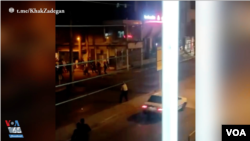U.N. High Commissioner for Human Rights Michelle Bachelet is condemning the violent suppression by Iranian security forces of protesters demanding action to resolve chronic water shortages in Khuzestan province.
Peaceful protests took place last week in several cities across Khuzestan in southwestern Iran over water shortages and mismanagement. Iranian security forces reacted by violently crushing the protests instead of addressing the longstanding water crisis.
Rights chief Michelle Bachelet is calling on the Iranian government to take urgent action to resolve the problem. She is urging that action instead of using excessive force to stifle debate and keep the population in line.
Her spokeswoman, Marta Hurtado, tells VOA the people of Khuzestan have legitimate grievances. She says the only way they can express them and have the government take notice is through protests.
"The impact of the devastating water crisis on life, health and prosperity of the people of Khuzestan should be the focus of the government’s attention, not the protests carried out by people driven to desperation by years of neglect," Hurtado said. "The High Commissioner said that she is extremely concerned about the deaths and injuries that have occurred over the past week, as well as the widespread arrests and detention.”
At least four people, including one minor, reportedly have been killed. Monitors believe the number of killings is likely to be higher as protests have spread to at least 20 major towns and cities in Khuzestan over the past week. Further protests reportedly have broken out in support elsewhere in Iran, including in the capital, Tehran, and in Lorestan province.
Khuzestan, a province of 5 million inhabitants, used to be the country’s main and most reliable source of water. However, Hurtado says years of alleged mismanagement, including the diversion of water to other parts of the country and nationwide droughts, have depleted the region of its precious resource.
"That is why the situation is defined by the High Commissioner as catastrophic because it is not something that has happened overnight," Hurtado said. "It has been building up for many years and the authorities have not been able to address it. That is why we call the authorities for recognition of what is happening and to address it.”
High Commissioner Bachelet says it is never too late to change tack. She is calling on Iranian authorities to instruct their security forces to abide by international standards on the use of force. And then, she says, the government should take immediate steps to mitigate the water crisis and put in place long-term sustainable policies.
Iranian authorities so far have not responded to the appeals.





